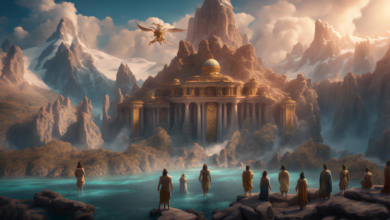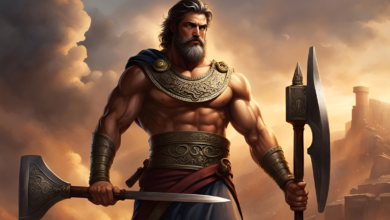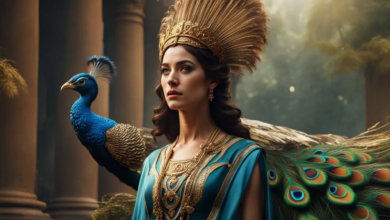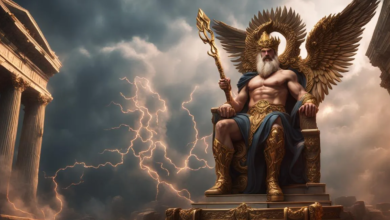Hercules, known as Heracles in Greek mythology, is one of the most renowned heroes of ancient times, embodying strength, courage, and the complexities of divine favour and wrath. Born to Zeus, the king of the gods, and Alcmene, a mortal woman, Hercules’s life was marked by extraordinary feats and tragic missteps, illustrating the enduring human struggle against fate and the quest for redemption.
The tale of Hercules begins with his divine birth, which incited the wrath of Hera, Zeus’s wife. Hera, known for her vengeful nature against her husband’s offspring with other women, sought to destroy Hercules from infancy. She sent serpents to kill him in his crib, but even as a baby, Hercules displayed his god-like strength by strangling the snakes. This early act of heroism was a mere preview of the life ahead of him—a life filled with daunting challenges and unparalleled achievements.
Hercules’s most famous exploits are encapsulated in the Twelve Labors, a series of tasks assigned to him as penance for a crime induced by Hera’s machinations. Driven mad by the goddess, Hercules tragically killed his wife, Megara, and their children. Upon regaining his sanity and being deeply remorseful, he sought purification and redemption. The Oracle of Delphi, speaking on behalf of Apollo, commanded him to serve King Eurystheus of Tiryns for twelve years, during which he was to complete a series of nearly impossible tasks.
These labours, designed to test his strength, courage, and wit, took Hercules across the world and beyond. Among the most famous of these tasks were the slaying of the Nemean Lion, whose invulnerable hide was pierced by Hercules himself; the capture of the Golden Hind of Artemis, a task that required not only strength but respect for the gods; and the cleaning of the Augean stables in a single day, a feat he accomplished by rerouting the rivers Alpheus and Peneus to wash away years of accumulated filth.
Each labour brought Hercules closer to atonement and deeper into the realm of legend. His exploits were not limited to these tasks; his adventures included battling the Hydra, capturing the Erymanthian Boar, and fetching the apples of the Hesperides, guarded by a dragon. Through these labours, Hercules encountered many creatures and challenges, from the mundane to the monstrous, each adding to his legend and illustrating the virtues and vices of gods and men alike.
Hercules’s journey was about physical strength, endurance, resilience, and the wisdom often born of suffering. His life was marked by moments of great joy and deep sorrow, from his victorious labours to the loss of his family. These experiences rendered him a complex character, capable of great kindness and terrible wrath, embodying the dual nature of humanity.
Despite his demi-god status, Hercules’s life was fraught with struggles that made him relatable to those who worshipped and adored him. He faced envy from gods and men, dealt with betrayal, and endured the pain of loss and the weight of guilt. Yet, through these trials, his true heroism shone, not because he was invincible, but because he persevered.
Hercules’s contributions to the Greek mythological canon extend beyond his labours. He participated in the Argonauts’ quest for the Golden Fleece, and his exploits were interwoven with the stories of other heroes and gods, showcasing the interconnectedness of Greek myths. His strength and heroism were so legendary that they earned him a place among the gods upon his death. After enduring so much, Zeus granted Hercules immortality, allowing him to live on Mount Olympus with the gods.
In the end, the story of Hercules is more than just a series of heroic feats; it is a narrative about the human condition, the struggles we face and the strength we find to overcome them. Hercules’s legend has endured through the ages, not only because of his superhuman deeds but because of his humanity. His story resonates with the idea that true heroism lies in the strength to confront our demons, the courage to do what is right, and the resilience to keep going, no matter the odds.
Hercules’s legacy has transcended ancient mythology, influencing art, literature, and culture for centuries. He symbolises heroism and human strength, inspiring countless works and adaptations. His story, echoing through the ages, reminds us of the enduring power of myth to reflect our deepest fears and highest aspirations.
Through Hercules, we see the embodiment of both the flaws and the potential within us. His life, marked by divine favour and mortal challenges, is a testament to humanity’s indomitable spirit. In Hercules’s tales of struggle and triumph, we find not just a hero of myth but a mirror of our journey through life’s trials and triumphs.
The enduring appeal of Hercules’s story lies in its universal themes—redemption, the quest for meaning, and the confrontation with one’s mortality. His labours, while fantastical, symbolise the personal battles we all face, the inner demons we fight, and the societal expectations we strive to meet. Hercules’s journey from a troubled soul to a celebrated hero mirrors our paths to personal growth and understanding. It’s a reminder that greatness often emerges from adversity and that heroism is as much about the battles we fight within as those we confront in the world around us.
Furthermore, Hercules’s story touches on legacy and how our actions resonate beyond our lifetimes. His deeds left an indelible mark on the world of mythology and beyond, serving as a benchmark for heroism and virtue. The myth of Hercules encourages us to ponder how our lives and actions will be remembered, urging us toward a path of righteousness and honour.
The character of Hercules also serves as a bridge between the divine and the mortal, illustrating the ancient Greeks’ views on the gods and their involvement in human affairs. Through his interactions with gods and monsters, Hercules’s story reveals the complexities of the divine, their capricious natures, and their impact on the mortal world. It underscores the belief in a cosmos where gods and humans are inexorably linked, each influencing the other’s fate.
In addition to its philosophical and moral underpinnings, the story of Hercules has played a significant role in the cultural and artistic heritage of the Western world. From ancient sculptures and vase paintings to Renaissance art, from classical literature to modern cinema, Hercules has been depicted in countless ways, each interpretation reflecting the values and concerns of its time. His figure has been used to symbolise physical strength and moral integrity, serving as an icon for athletes, warriors, and leaders.
Today, Hercules’s influence can be seen in popular culture, where his likeness and labours inspire movies, TV shows, books, and comics. These modern adaptations often play with the themes of his myth, updating them for contemporary audiences while retaining the core elements that have made his story resonate for millennia. Through these retellings, Hercules remains a fixture in our collective imagination, a timeless hero who embodies the challenges and aspirations of human existence.
In conclusion, the myth of Hercules, with its rich tapestry of godly intervention, heroic deeds, and human emotion, offers a profound exploration of the human spirit. His story is a testament to the enduring power of mythology to convey timeless truths about the human condition. Hercules teaches us about resilience, redemption, and the pursuit of greatness through his trials and triumphs. As we navigate our lives, faced with challenges and choices, Hercules’s legacy serves as a beacon, reminding us of our strength to overcome adversity and carve out our destinies. In the legend of Hercules, we find not just a hero of ancient times but an eternal symbol of what it means to be truly heroic.





